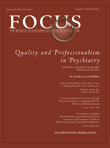Promoting Quality Patient Care Through Physician Competence: Applying Deliberate Practice to Lifelong Learning
Abstract
A DEFINITION OF PHYSICIAN COMPETENCE
There are several important aspects of physician competence that deserve special emphasis. First, physician competence is inherently peer-driven. Requirements and standards for competence found in training program accreditation, board certification and maintenance of certification, patient care practice guidelines, credentialing, licensing, and peer review are all developed and administered by special committees of physician peers. Second, physician competence is in part patient-determined. In the era of patient advocacy and patient-centered care, the assessment of a physician's competence is incomplete without considering the opinions of patients served by that physician (6). Third, physician competence is constantly evolving. The basic knowledge, skills, attitudes, and behaviors for competence must of necessity change with new discoveries, technologies, health care system structures, and social mandates (7). Fourth, physician competence is a continuous process. Partly because of the evolving nature of competence, physicians cannot maintain those abilities without ongoing attention to their knowledge and skills (8). Fifth, physician competence is behavioral. Physicians must not only possess the knowledge, skills, and attitudes to provide quality care, but they must also demonstrate that competence when they evaluate and treat their own patients (9). Finally, physician competence requires documentation. In a society that focuses increasing attention on accountability, physician training, board certification, and reputation for competency are being replaced by increasing demands for the on-going, objective documentation of acceptable performance (10).A competent physician possesses and demonstrates the special knowledge, skills, attitudes, and behaviors required to provide quality patient care.
PERSPECTIVES ON PHYSICIAN COMPETENCE
DOCUMENTING CONTINUOUS PHYSICIAN COMPETENCE THROUGH MAINTENANCE OF CERTIFICATION
FACTORS CONTRIBUTING TO PROBLEMS IN PHYSICIAN COMPETENCE
PROMOTING PHYSICIAN COMPETENCE THROUGH LIFELONG LEARNING
OVERCOMING CHALLENGES TO LLL THROUGH DELIBERATE PRACTICE
CONCLUSION
REFERENCES
Information & Authors
Information
Published In
History
Authors
Funding Information
Metrics & Citations
Metrics
Citations
Export Citations
If you have the appropriate software installed, you can download article citation data to the citation manager of your choice. Simply select your manager software from the list below and click Download.
For more information or tips please see 'Downloading to a citation manager' in the Help menu.
View Options
View options
PDF/EPUB
View PDF/EPUBGet Access
Login options
Already a subscriber? Access your subscription through your login credentials or your institution for full access to this article.
Personal login Institutional Login Open Athens loginNot a subscriber?
PsychiatryOnline subscription options offer access to the DSM-5-TR® library, books, journals, CME, and patient resources. This all-in-one virtual library provides psychiatrists and mental health professionals with key resources for diagnosis, treatment, research, and professional development.
Need more help? PsychiatryOnline Customer Service may be reached by emailing [email protected] or by calling 800-368-5777 (in the U.S.) or 703-907-7322 (outside the U.S.).

